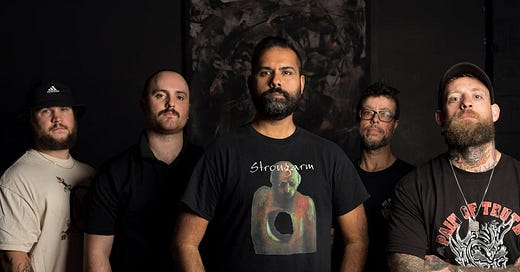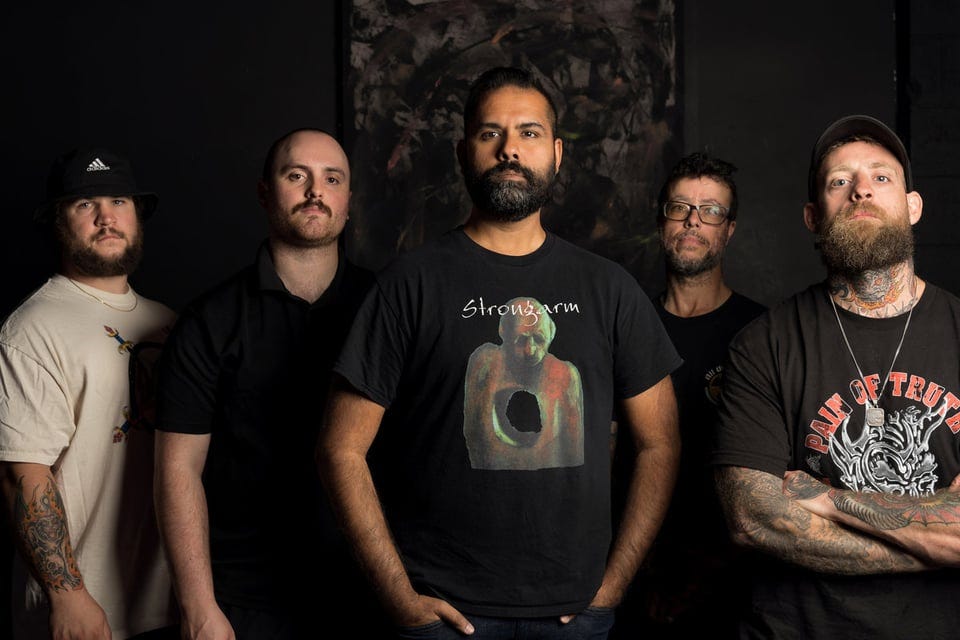Poisoned Seeds' Avrinder Dhillon finds fertile ground home-recording hardcore
BY GREGORY ADAMS
Poisoned Seeds guitarist Avrinder Dhillon’s handiwork is all over the Vancouver hardcore group’s new, self-titled 12-inch for War Records.
That’s him delivering the savagely dialed-in riffery through pieces like “Blame the Witch,” but it’s also him capturing those sounds through a home-recording rig in his basement Ziyen Studios. Both sides to this are longtime passions.
“I was always interested in learning how to make my own recordings — to save money, essentially,” he recalls of the latter, in particular, explaining that he’d moved from the West Coast out to Winnipeg, Manitoba in the ‘00s to play in hardcore bands and work on engineering techniques. It didn’t go according to plan.
“I went to recording school there, but it burnt me out. I didn’t touch recording software for years, but then a buddy asked me for help with a recording, and I said sure! It kind of got me hooked again.”
The recording in question was a grimy, NYHC-style demo from Manitoban beatdown force Still Fighting (“Still awesome,” he quips), but since getting back to B.C., Avi has captured releases for groups like Keep It Clear, World View, Backbite, Change, and most recently his own Poisoned Seeds.
Following a day of shooting in-studio promo photos for Rain City Recorders’ Jesse Gander — Avi also runs his own photo business — the hardcore guitarist dished on the crushing ‘90s playlist vibes of the Poisoned Seeds record, and diming guitar plugins on his own time.
This interview has been edited and condensed.
Considering the drums on the Poisoned Seeds album were tracked in town with Jesse at Rain City, and Tim Creviston recorded the vocals at his own studio space, why did you decide to still handle the guitars from home?
AVRINDER DHILLON: I knew I’d be picky over how it sounded, but also it was to save money. That way I would have control of how [the guitars] would sound. And also, sometimes ideas just pop into my head in the middle of the night, so if I wanted to edit or add to the recordings in any way, I could. It’s the convenience of just going downstairs.
Are you running plugins, or are you miking up a legit rig?
DHILLON: I was using STL ToneHub. I subscribe to that monthly. I knew what kind of sound I wanted: the sustain of a 5150, but with the bite of Triple Rectifier.
It’s a pretty barebones set up at my place. I just have a Universal Audio Apollo running into Logic Pro. For guitar I use STL ToneHub, and then for bass I’ll use a Neural Parallax.
Are you using any particular guitarist’s expansion pack on ToneHub?
DHILLON: I wanted an eerie sense of urgency for the intro of “Painkiller” before the drums kicked in…and I was able to use the Storch Filter to get the sound that I had heard in my head for it. The distortion was ToneHub’s Colin Richardson pack; I also used that expansion pack for the rhythms. I used the Colin Brittain pack for the cleaner channel with reverb and delay.
What are you running amps/effects-wise in a live setting?
DHILLON: I use an Axe FX II with the Matrix GT1000FX-2U power amp plugged into an Art Pro Audio PS4X4 8-Outlet Power Conditioner. Rob [Foster, guitarist] uses a 5150 head, tuner, and noise suppressor. Taylor [Stuart, bassist] runs an Orange OB1 500 into a tuner and BOSS ODB-3 overdrive.
What guitars are on this record?
DHILLON: Most of my guitars were stolen years ago, so I just have my one tried-and-true Gibson Les Paul, a black Studio. For the leads on “Deceit” and “Dark Clouds,” Rob used an ESP LTD MH-1000 with Seymour Duncan blackout active pickups. Taylor used a Jackson Pro Series Soloist for the dive bombs on “Blame the Witch” and “Dark Clouds.”
My bass is honestly the same bass my parents gave to me back in Christmas ’97. It’s a Yamaha. I couldn’t tell you the series because it’s been so long, but it’s the first bass I ever had. It still has Nerve Agents and AFI stickers on it.
Are you playing bass on this?
DHILLON: Yeah, I played bass on the recording.
It’s a short record — seven songs — though within that you re-recorded “Dark Clouds” from Poisoned Seeds’ ’22 Demo. What did the song gain from getting a second pass?
DHILLON: I really liked how the ending of the song has so many layers to it, with a choir, synths, metal guitars, and Brad’s amazing vocals on it. Honestly, I wanted to record it again to have more clarity in the lead. It’s a little slower than the demo version, which gives the song a bit more room for the groove. Brad killed it on both recordings, but on the newer version his vocals sound real great.
“Blame the Witch” really divebombs into some Swedish death metal sounds…
DHILLON: It’s no secret that I love At the Gates and that more melodic, Gothenburg sound. I continually go back to Slaughter of the Soul. It still gives me chills. You know, one day I’ll probably do a full-fledged At the Gates worship band, but if I can throw a little of that influence in there with Poisoned Seeds, I’m happy.
What else is inspiring you for this, then?
DHILLON: Poisoned Seeds seems to be like a ‘90s music playlist. It’s a bit of Hatebreed; a bit of AFI; a bit of Shai Hulud; and 100 Demons. Actually, we didn’t have the song title for “Blame the Witch” when we were demoing it, so we were calling it “10 Demons,” because it sounded so much like 100 Demons.
I’ve been staring at the finger positions of the Grim Reaper on your album cover for a while now. It almost looks like he’s chording out something, using his scythe as a guitar. What do you think he’s playing?
DHILLON: I mean… “Don’t Fear the Reaper” would be my dad joke. I would also say he’s starting out with “Smoke on the Water,” but then might go into something more advanced like “Lithium” by Nirvana.
How about a Poisoned Seeds song?
DHILLON: I guess “Blame the Witch,” because a witch is almost in the same world as a Grim Reaper.
It’s funny, the record cover is great, but after we got it back I was like, “Man we should have re-recorded ‘The Reaper,’” from the demo. I’m not one to always re-record old songs, but that feels like a missed opportunity. [Laughs]
Poisoned Seeds' self-titled LP is out now and available via War Records.
END HITS
Coco Koop “Try”
Coco Koop is a new project from Terry Ondang, the longtime studio manager at Gabriola, BC’s esteemed Noise Floor Recording Studio. Then again, if you’ve been following Gut Feeling for a while, you might recall that she was teasing the release all the way back when we did our podcast episode together in 2021. Either way, I am hyped that this is finally out in the open.
The title cut to Coco Koop’s Try EP is lightly fuzzed and gentle-jangled, with Terry taking on the bulk of the guitar, drum, and vocal duties — studio partner Jordan Koop undulates a few twangin’ guitar licks, too. Softly sung wisdom for the big-of-heart, to keep pushing through “whenever storms darken through” (“please stay wild / please stay open”).
There’s no perfect way to qualify this, but “Try” sounds like an early spring song to me. The kind of arrangement that feels best filtering through a March/April breeze. Light jacket pop.
Parlor Greens “West Memphis”
Oh, you want to stick with podcast-adjacent follow-ups? Well, Jimmy James — the serenely stylish contemporary king of Seattle soul guitar, whom we also spoke with in 2021 — has just debuted a new project of his own called Parlor Greens. Actually, to be fair, they popped up on socials last April, though they just unveiled their first formal single, “West Memphis,” a couple of weeks ago.
It’s a lean little jam, where Jimmy pokes out a lithe, percussive bit of note-smithing like a baby bird plucking bread crumbs from the ground. Golden bread crumbs. Truly the best sounding bread crumbs. Adam Scone smears the whole thing with some morning glow organ; drummer Tim Carman delivers a subtle, sophisticated shuffle.
It kind of sounds like they recorded this on the fly over at Loveland, OH’s Colemine studio. Here’s hoping they banked a whole damn LP there, too.



